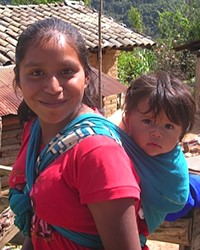Nahuatl, Southeastern Puebla in Mexico

Photo Source:
Copyrighted © 2026
International Mission Board-SBC - Jeff Dunson All rights reserved. Used with permission |
Send Joshua Project a map of this people group.
|
| People Name: | Nahuatl, Southeastern Puebla |
| Country: | Mexico |
| 10/40 Window: | No |
| Population: | 143,000 |
| World Population: | 145,700 |
| Primary Language: | Nahuatl, Southeastern Puebla |
| Primary Religion: | Christianity |
| Christian Adherents: | 95.00 % |
| Evangelicals: | 1.50 % |
| Scripture: | New Testament |
| Ministry Resources: | Yes |
| Jesus Film: | Yes |
| Audio Recordings: | Yes |
| People Cluster: | Aztec |
| Affinity Bloc: | Latin-Caribbean Americans |
| Progress Level: |
|
Introduction / History
The Nahuatl peoples have the ancient and powerful Aztecs as their ancestors. Their language was the trade language of the Aztec Empire. Linguists can trace modern Nahuatl languages back to the Aztecs who lived in the same locations centuries ago. They often called themselves "Mexicano" from which Mexico was named. Together the Nahuatls make up between one fifth and one fourth of Mexico's indigenous population. There are many Nahuatl languages including Southeastern Puebla. Through the last 500 years, there have been many borrowed words in Spanish and even English with Nahuatl roots. Avocado, chipotle, chili, chocolate, tomato and coyote are all examples of Nahuatl words adopted into Spanish and English.
Most Nahuatl speakers live in central Mexico where their ancestors lived long before the arrival of the Spanish conquistadors. The Southeastern Puebla Nahuatl live mainly in the states of Puebla and Veracruz.
What Are Their Lives Like?
Rural Nahuatl people eke out an existence by growing corn, beans, squash and chili peppers. Many grow coffee and sugar cane as a cash crop. They raise livestock for food and use donkeys as draft animals. They make their own rope and bricks. Some have tried to make and sell crafts such as clothes, pottery and baskets for a living, but this is becoming more difficult.
The more fortunate Nahuatl people work in the tourist industry. There are Nahuatl women who own and operate motels which cater to wealthy Mexican tourists. They often hire other Nahuatl people. Most are generous with their profits, sharing them with Nahuatls who are less fortunate. There is a strong sense of community among them.
Like all other peoples, rural Nahuatl look to elders for wisdom and advice. Their families include a father, a mother and children. Nahuatl boys are given land often by age nine so they can learn the responsibility that goes with cultivation. Their sisters look after small children while the mother does her chores. Girls marry in their late teens while boys marry in their 20s. They usually marry within their villages unless they have run out of possible mates that aren't cousins. The Nahuatl don't consider it a complete marriage until they bear children.
What Are Their Beliefs?
Like most indigenous peoples of Mexico, the Southeastern Puebla Nahuatl have elements of their ancient religious practices blended in with Roman Catholicism. Their ancestors replaced the ancient gods with Catholic saints and look to them for their needs. When the gospel gets diluted or compromised by ancient practices, we call it syncretism.
There are various degrees of syncretism among the Nahuatl. Some have embraced a Christ-centered faith while others dilute it with pre-Colombian gods and rituals.
What Are Their Needs?
Like people everywhere, the Nahuatl people need to put all their hope and faith in Jesus Christ. He alone died to pay for their sins and offers victory over death for eternity.
Prayer Points
Pray for the Lord to bless Southeastern Puebla Nahuatl households and communities economically and spiritually so they will know the power and love of God.
Pray for the Holy Spirit to move powerfully among the Southeastern Puebla Nahuatl people, drawing them to the cross and the empty grave.
Pray for the Lord to do whatever it takes to turn Nahuatl hearts away from spirits that come to deceive and derail living faith.
Pray for Southeastern Puebla Nahuatl disciples to make more disciples.